-
1-800-719-BIOP (1-800-719-2467)
-
[email protected]
Brain fog and lack of mental clarity can be major obstacles and sources of frustration in our journey to optimal health and peak performance. Whether we want to give our best at work, or simply enjoy the fullness of life, being unable to focus on our goals or the tasks at hand interferes with our ability to be present and achieve success.
Though many of us recognize when our bodies need a little more attention, we're not so quick to nurture our cognitive health. Mental decline and weakened cognitive performance might be common, but they don't have to be your normal.
Boost your brain health, mental clarity, learning, memory, and focus by improving your gut bacteria
Relieve brain fog and procrastination
Promote relaxation and a balanced stress response
Enhance cognitive function, mood and stress resilience by improving your gut flora
Balance your neurotransmitters, including acetylcholine, serotonin, GABA, and dopamine in the brain
Protect your brain against oxidative stress
Improve blood circulation to the brain
Support digestive health and bowel regularity
Brain fog refers to confusion, forgetfulness, and inability to focus or think clearly. It is not a formal diagnosis, but a symptom that many people struggle with. Though it's become common, it is not "normal" or "healthy." Brain fog could be a symptom of mental health issues or the beginning stages of cognitive decline, so it is important to identify its underlying root causes and address them.
High levels of oxidative stress in the brain jams the brain mitochondria, causing your neurons to be sluggish. Lifestyle factors that elevate brain oxidative stress include:

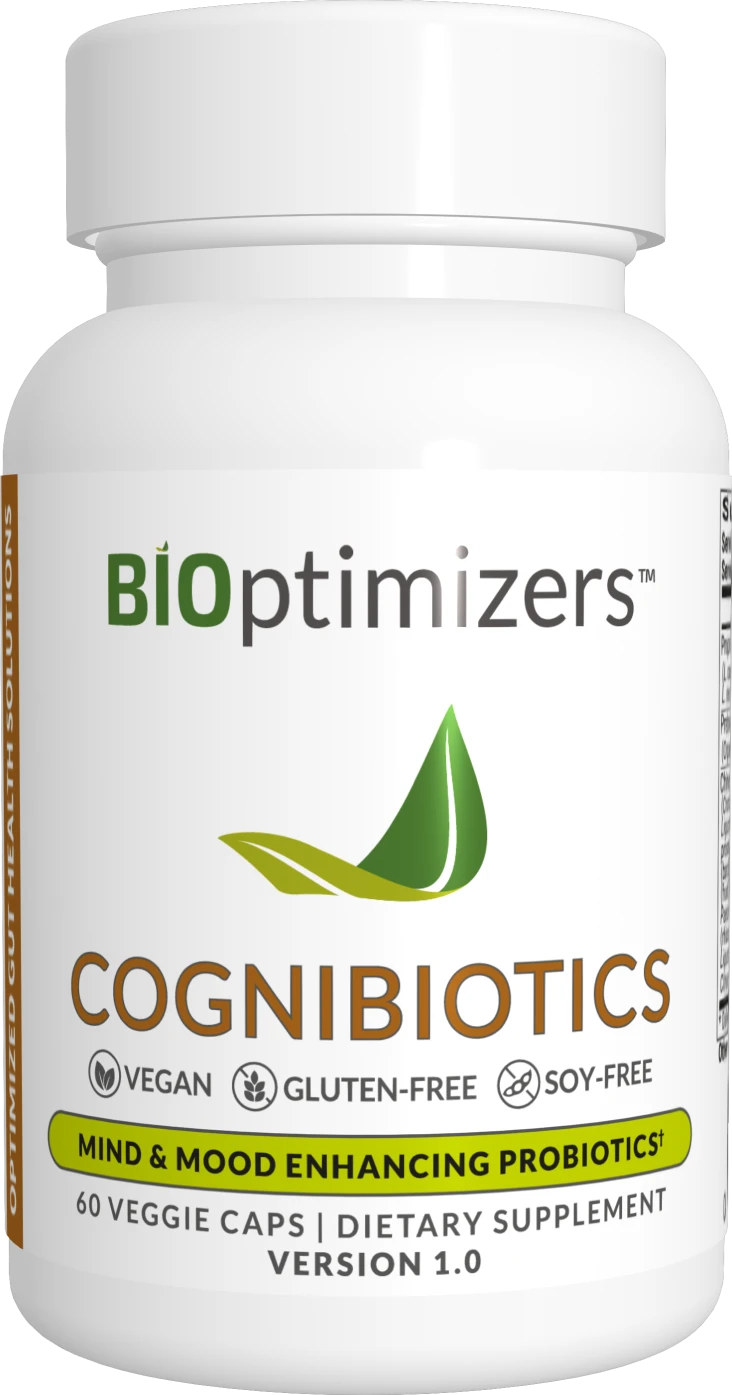
CogniBiotics is the only probiotic-nootropic blend on the market that improves the entire gut-brain-microbiota axis. In addition to containing some of the best probiotic strains for cognitive performance, it also contains:
This state of the art formulation is designed to:
Nootropics are substances known to improve cognitive function, including memory, creativity, sharpness and motivation. They're nutrients for the brain.
But unlike many of the nutrients we get through a healthy diet, getting nootropics through food sources alone can be close to impossible. That’s why we made it our mission to combine the best nootropics available into a single brain health supplement, where all the ingredients work together synergistically. Not all brain supplements are formulated the same, and we created the best supplement to keep your mind sharp and boost your brainpower.

We all know that probiotics are good for the body because they enhance digestion but… how does that impact the brain?
The brain and the gut are intricately connected through what’s known as Gut-Brain-Microbiome Axis [1]. Just like the brain, the gut contains over 30 different types of neurotransmitters.
About 90% of serotonin, also known as “the happiness hormone,” is produced in the gut. [2] GABA, dopamine, acetylcholine, and melatonin, among other key neurotransmitters, are also produced there. It’s no surprise the gut is often called, "THE SECOND BRAIN".
Good bacteria in the gut are responsible for generating these neurochemicals.[3]
That’s why probiotics are the key to a balanced microbiome that is capable of enhancing mental health…
But not all probiotic brain supplements are the same. For Cognibiotics, we carefully selected the 10 strains that are scientifically proven to be the most efficient at regulating the brain-gut axis. We then made sure they're capable of surviving the various changes in pH throughout the digestive tract.
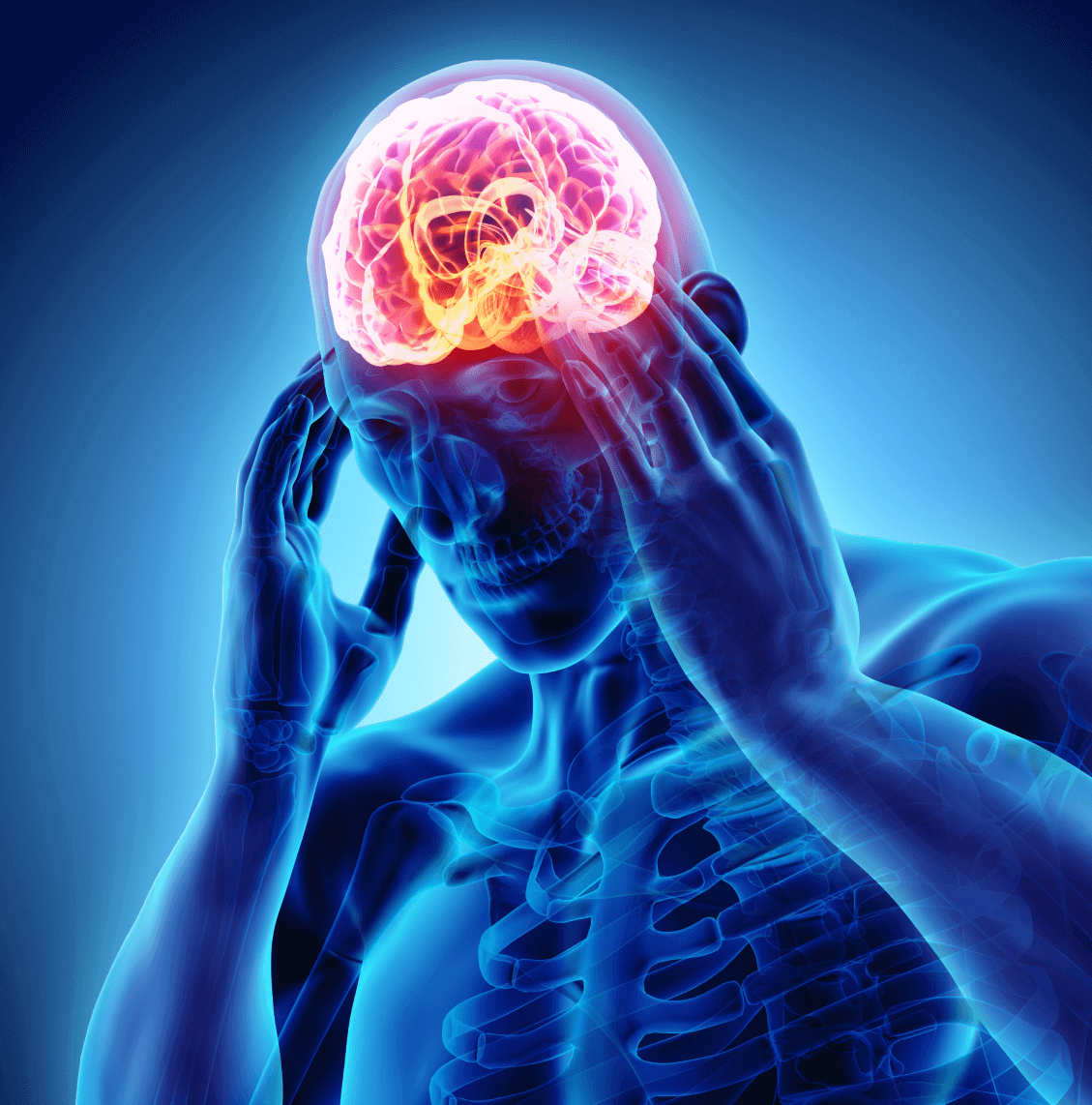
Brain fog, memory issues and difficulty concentrating are easily mistaken with being absent-minded or simply lazy. In reality, they're more often signs of improper communication between brain cells. Chemicals known as neurotransmitters are responsible for this communication, and the bacteria balance in our gut plays a key role in their production [4].
Research has shown that improving the microbiome composition can be beneficial, even for people with neurological disorders [5]. But please note, Cognibiotics is not a substitute for medical treatment. Consult a physician before beginning any new supplement, diet, training program, or if you’re undergoing treatment of a medical condition.

Acetylcholine is an important neurotransmitter for learning and memory.
P. multiflorum, S. miltiorrhiza, and R. glutinosa in Cognibiotics increase acetylcholine levels [7].
Most brain supplements in the market contain ingredients that boost cognitive function, but these probiotics are like having a factory of positive neurochemicals in your own body.

Studies show[8] the probiotics L. plantarum, L. helveticus, L. fermentum, L. rhamnosus, and B. infantis promote the balance of serotonin, dopamine and GABA in the brain.
Well-balanced neurotransmitters will help to boost and sustain your mood, improve cognitive function, and support you in having a healthy stress response.
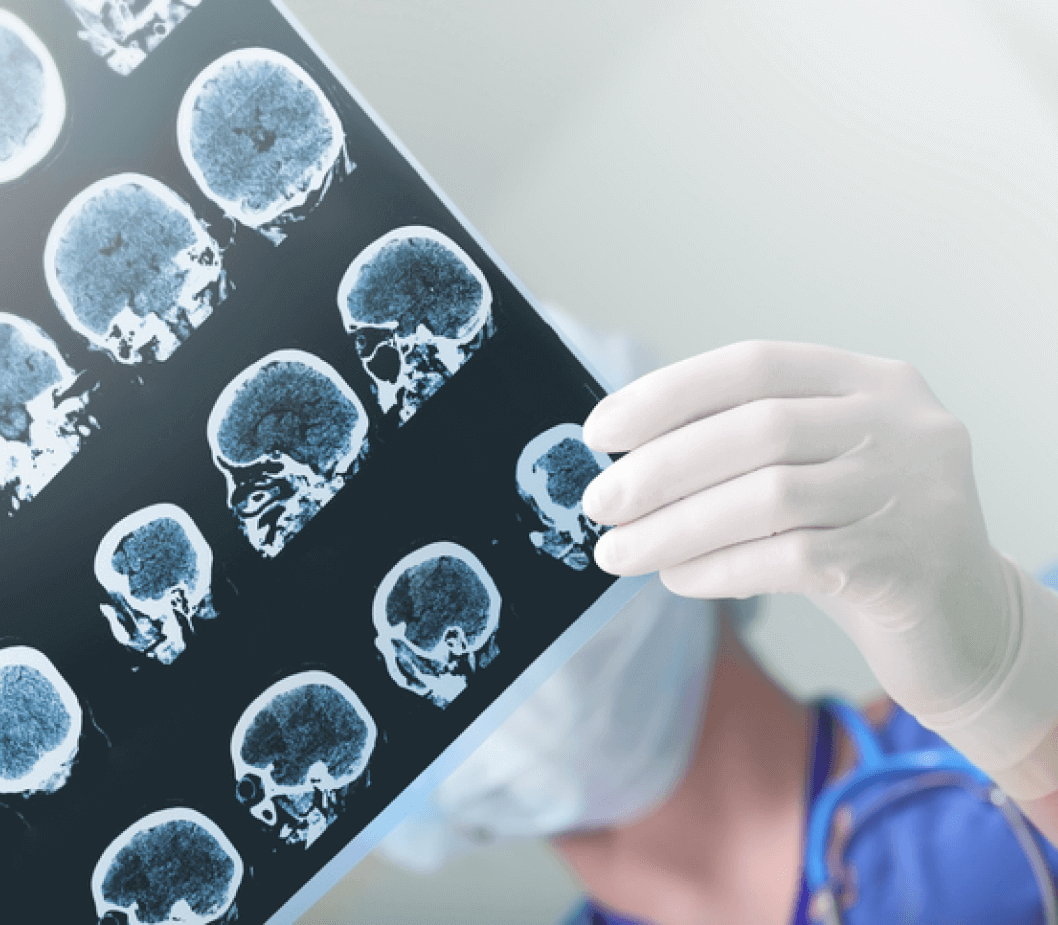
The brain is a muscle. Like other muscles, it is strengthened through consistent use and proper nourishment.
The good bacteria [9] and herbs [10] in Cognibiotics work together to stimulate the production of proteins that help the brain grow, reorganize, and adapt. Increasing these proteins helps with learning, memory, and mood.
This is why Cognibiotics is one of the best brain health supplements for improving cognitive functions.

The herbal blends in Cognibiotics also help to protect neurons against oxidative stress.
Oxidative stress is an inevitable part of our daily routine. It comes from mental and emotional stress, environmental toxins, inflammation, unhealthy lifestyle, and more. We rarely consume enough antioxidants in our diets to withstand oxidative stress. This can contribute to brain cell damage, which may lead to brain fog, fatigue, and neurological aging.
Herbs in Cognibiotics contain antioxidants that can cross the blood-brain barrier and protect your brain from day-to-day oxidative stress [11].
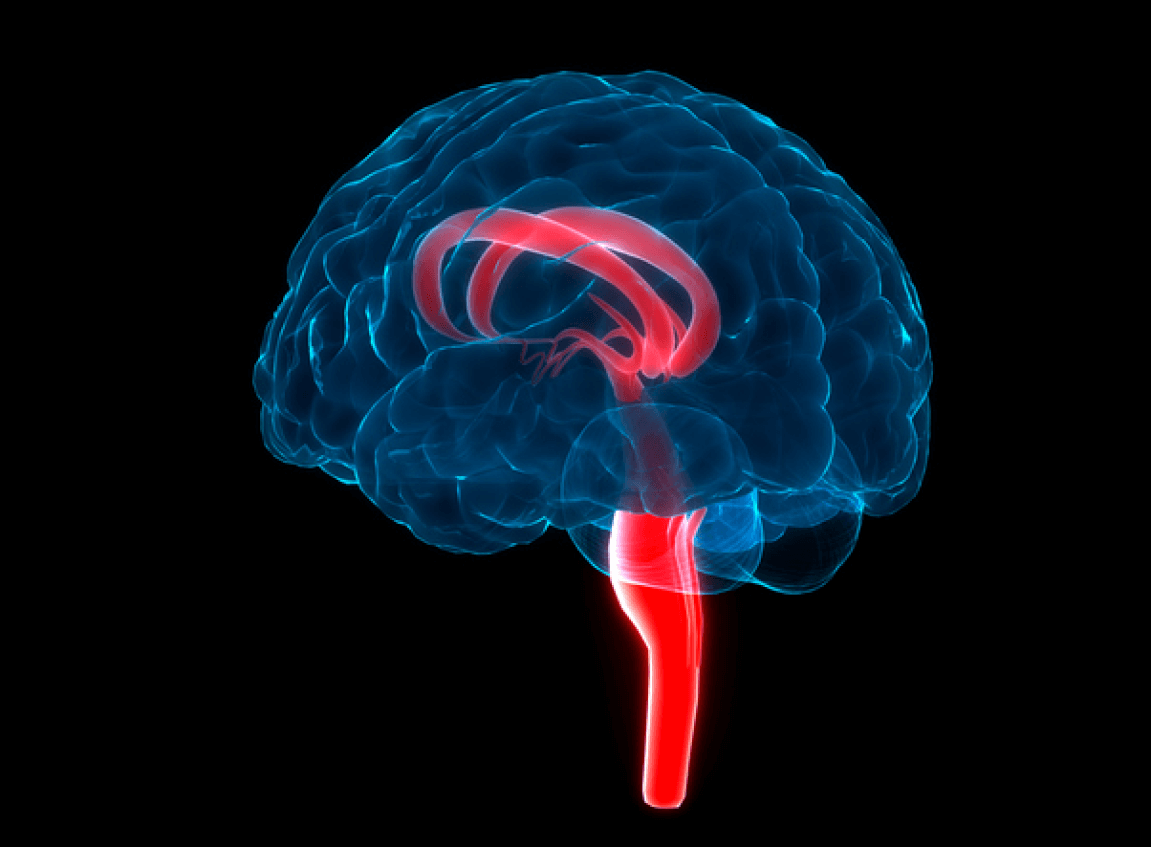
Your brain needs oxygen and vital nutrients to work well. Because it's located at the highest point in your body and connects to many tiny blood vessels, it's also the organ that's hardest to deliver blood to. This reduced blood flow can translate to deprivation of proper oxygen and nutrients. This can cause fatigue, brain fog, poor memory, and low mood.
This reduced blood flow can translate to deprivation of oxygen and nutrients. This can cause fatigue, brain fog, poor cognitive function, and low mood.
The Chaihu-Shugan San herb formula normalizes brain blood flow [12] in patients with depression.

Among the benefits of probiotics is the generation of beneficial chemicals from their metabolism, “postbiotics”. One of the most well known is butyrate.
Low mood, brain fog, and fatigue[13] are caused by sluggish neurons that can’t produce enough energy (ATP). The small fatty acids like butyrate[14] can enter the brain, energize the sluggish neurons, and lower oxidative stress.
The small fatty acids also counteract chronic inflammation[15] and strengthen the gut and blood-brain barriers[16]. They also promote a healthy metabolism and blood sugar levels which are important for mental alertness.

Purchased the first pot two months ago, and must say it really does exactly what it's supposed to. My gut is in better shape and my mind is certainly sharper and calmer, just what is needed in this current climate.
Anything by BiOptimizers is worth trying. They’re products are the best quality out there. Try Cognibiotics, it’s totally worth it!
For the last two years, I've been struggling with feeling awake in the morning before 10 am. Even with coffee or tea, I felt that I lacked energy to study and work. I've taken other probiotic blends of Lactobacillus and Bifidobacterium and most of them don't make a noticeable improvement in health. However, here's where Bioptimizers products differ. In addition to taking P3om (for several months) prior, I've been taking Cognibiotics once a day, in the morning for about 10 days, and I notice the difference in energy. I highly recommend trying Cognibiotics.
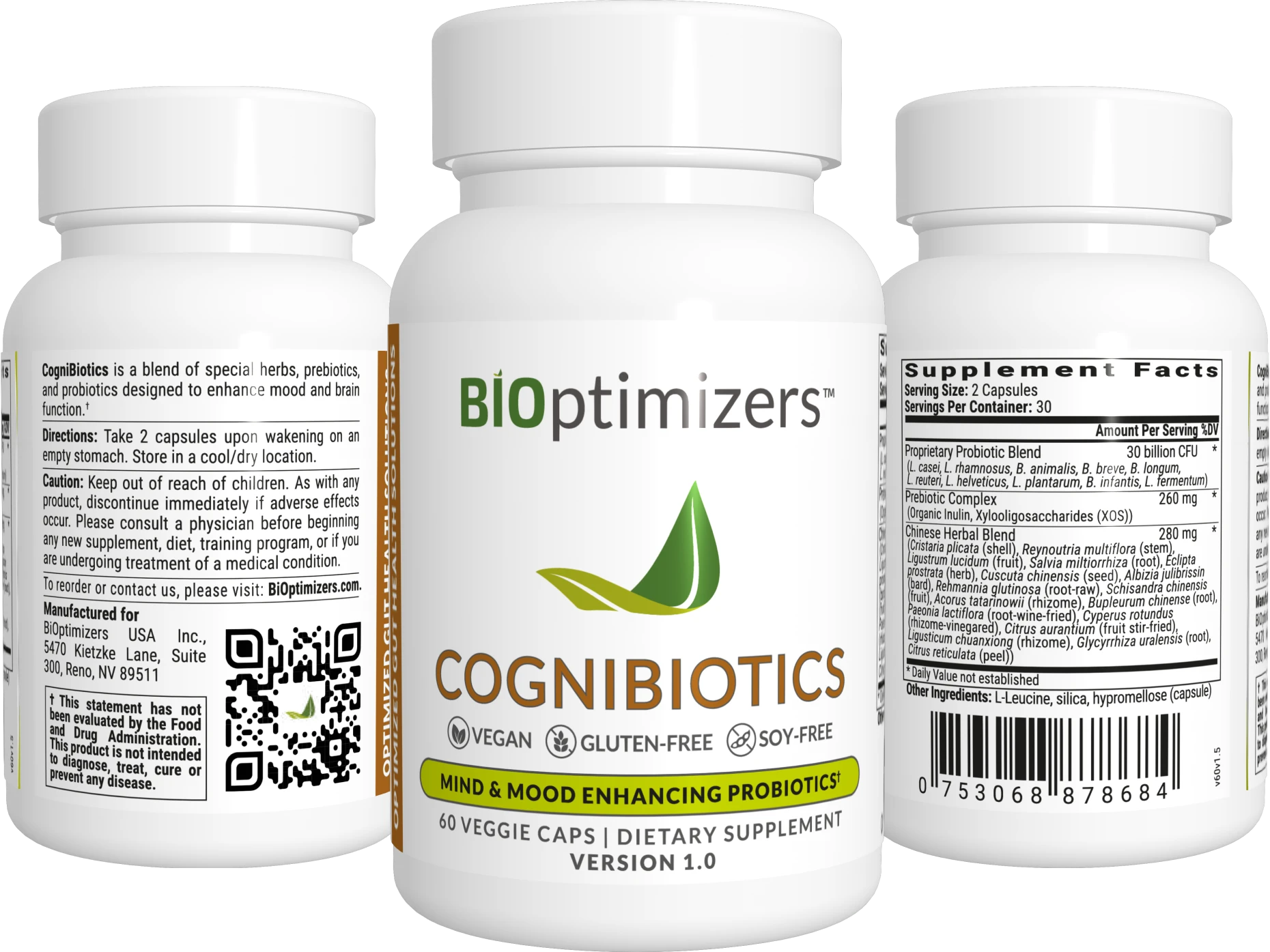

Mental clarity is having a clear and focused mind. You can think clearly, make decisions, and deal with day to day demands without getting overwhelmed or exhausted. You’re also less likely to procrastinate and have no trouble accomplishing your tasks.
Best foods for memory include:
There are multiple ways to use supplements to improve mood. For example, you can provide more neurotransmitter building blocks by using 5-HTP and tryptophan to build more serotonin, or L-tyrosine to build more dopamine. St. John’s Wort is an herb that increases serotonin. You can also supply vitamins, such as vitamin B6, to promote healthy neurotransmitter production.
Your brain works best when your neurotransmitters are properly balanced, and the overall health of your gut and its microbiome can affect this balance, as well as your mood. Some of the best brain supplements and lifestyle choices that work to naturally support your mood include:
Brain-derived neurotrophic factor (BDNF) is a protein in the brain that is important for learning, memory, and mood. It stimulates the production of new brain cells and supports the connections between existing ones (synaptic plasticity)[17]. Exercise helps with depression by increasing BDNF levels. Also, higher BDNF improves memory, speed of learning, and makes your brain younger.
BDNF also protects the brain and helps it stay flexible (plastic) enough to adapt to new situations and even insults.
There are many potential reasons you could be experiencing low mood, such as:
Many people suffer from more than one of the above. Cognibiotics can often help balance the microbiome, neurotransmitters, and the immune system, which can naturally lift your mood. However, since there could be other contributing factors, you should also work with your physician and the appropriate mental health care provider.
The gut-brain-microbiome axis describes the intimate 2-way connections between your gut, your brain, and your gut microbiome. This might explain why people sometimes say they have a gut feeling or that they feel sick to their stomach.
There are numerous ways these connections happen. Examples include:
There are multiple entry points to fixing your gut-brain-microbiome axis. First, to improve your mental performance, it is important to eat a healthy diet, get good quality sleep, manage your stress, and exercise. Taking probiotics often helps, but does not replace diet and lifestyle factors. Most probiotic strains are also transient and don’t result in permanent microbial changes, which may be required for long-lasting shifts in brain function.
Cognibiotics is a great way to supercharge your gut-brain axis because it is much more than a probiotic. The combination of bacteria strains and prebiotics have been shown to synergistically boost mood and brain function.[30] The 17 herbs in the formula target the brain, the gut, and the gut microbiome. The Chaihu-Shu-Gan-San formula boosts mood by improving the gut bacteria composition.
Martin CR, Osadchiy V, Kalani A, Mayer EA. The brain-gut-microbiome axis. Cell Mol Gastroenterol Hepatol. 2018;6(2):133-148. https://doi.org/10.1016/j.jcmgh.2018.04.003
De Vadder F, Grasset E, Mannerås Holm L, et al. Linking the gut Microbiota to a brain neurotransmitter. Proc Natl Acad Sci U S A. 2018;115(25):6458-6463.
Jameson KG, Hsiao EY. The role of protein digestibility and antacids on food allergy outcomes. Trends Neurosci. 2018;41(7):413-414. https://doi.org/10.1016/j.tins.2018.04.001
Morais, L. H., Schreiber, H. L., 4th, & Mazmanian, S. K. The gut microbiota-brain axis in behaviour and brain disorders. Nat Rev Microbiol. 2021;19(4):241-255. https://doi.org/10.1038/s41579-020-00460-0
Cryan JF, O'Riordan KJ, Cowan CSM, et al. The Microbiota-Gut-Brain Axis. Physiol Rev. 2019;99(4):1877-2013. doi:10.1152/physrev.00018.2018
Yu M, Jia HM, Zhang T, et al. Gut Microbiota is the Key to the Antidepressant Effect of Chaihu-Shu-Gan-San. Metabolites. 2020;10(2):63. Published 2020 Feb 10. doi:10.3390/metabo10020063
Howes MR, Fang R, Houghton PJ. Effect of Chinese Herbal Medicine on Alzheimer's Disease. Int Rev Neurobiol. 2017;135:29-56. doi:10.1016/bs.irn.2017.02.003
Wang H, Lee IS, Braun C, Enck P. Effect of Probiotics on Central Nervous System Functions in Animals and Humans: A Systematic Review. J Neurogastroenterol Motil. 2016;22(4):589-605. doi:10.5056/jnm16018
Ohland CL, Kish L, Bell H, et al. Effects of Lactobacillus helveticus on murine behavior are dependent on diet and genotype and correlate with alterations in the gut microbiome. Psychoneuroendocrinology. 2013;38(9):1738-1747. doi:10.1016/j.psyneuen.2013.02.00
Feng DD, Tang T, Lin XP, et al. Nine traditional Chinese herbal formulas for the treatment of depression: an ethnopharmacology, phytochemistry, and pharmacology review. Neuropsychiatr Dis Treat. 2016;12:2387-2402. Published 2016 Sep 20. doi:10.2147/NDT.S114560 11
Packer L. Oxidative stress, antioxidants, aging and disease. In: Cutler R.G., Packer L., Bertram J., Mori A. (eds) Oxidative Stress and Aging. Molecular and Cell Biology Updates. Birkhäuser Basel; 1995:1-14. https://doi.org/10.1007/978-3-0348-7337-6_1 Molecular and Cell Biology Updates. Birkhäuser Basel; 1995:1-14. https://doi.org/10.1007/978-3-0348-7337-6_1
Qiu J, Hu SY, Shi GQ, Wang SE. Changes in regional cerebral blood flow with Chaihu-Shugan-San in the treatment of major depression. Pharmacogn Mag. 2014;10(40):503-508. doi:10.4103/0973-1296.141775
Schönfeld P, Wojtczak L. Short- and medium-chain fatty acids in energy metabolism: the cellular perspective. J Lipid Res. 2016;57(6):943-954. doi:10.1194/jlr.R067629
Chambers ES, Preston T, Frost G, Morrison DJ. Role of Gut Microbiota-Generated Short-Chain Fatty Acids in Metabolic and Cardiovascular Health. Curr Nutr Rep. 2018;7(4):198-206. doi:10.1007/s13668-018-0248-8
Braniste V, Al-Asmakh M, Kowal C, et al. The gut microbiota influences blood-brain barrier permeability in mice[published correction appears in Sci Transl Med. 2014 Dec 10;6(266):266er7. Guan, Ng Lai [corrected to Ng, Lai Guan]]. Sci Transl Med. 2014;6(263):263ra158. doi:10.1126/scitranslmed.3009759
Puddu A, Sanguineti R, Montecucco F, Viviani GL. Evidence for the gut microbiota short-chain fatty acids as key pathophysiological molecules improving diabetes. Mediators Inflamm. 2014;2014:162021. doi:10.1155/2014/162021
Miranda M, Morici JF, Zanoni MB, Bekinschtein P. Brain-Derived Neurotrophic Factor: A Key Molecule for Memory in the Healthy and the Pathological Brain. Front Cell Neurosci. 2019;13:363. Published 2019 Aug 7. doi:10.3389/fncel.2019.00363